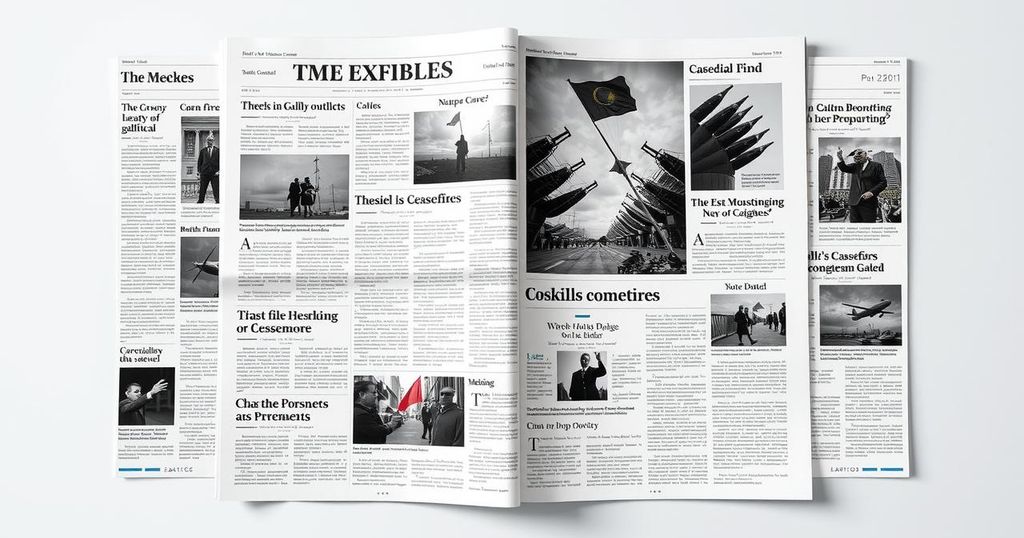Ceasefire Agreed with Iran as Tensions Escalate in Middle East

U.S. President Trump claims a ceasefire agreement between Israel and Iran, while missile strikes from Iran have increased tensions in the Middle East. The UK faces internal calls for defense spending amid rising numbers of high-income individuals leaving due to tax increases and economic concerns. Various papers cover these developments with differing angles, reflecting urgency.
In a surprising development, U.S. President Donald Trump announced a ceasefire agreement between Israel and Iran, a claim prominently featured in The Daily Telegraph. Trump described the ceasefire as “complete and total,” though he acknowledged its phased implementation starting at 05:00 BST on Tuesday. Alongside this, Prime Minister Sir Keir Starmer pledged to spend £40 billion on defense, which shadow defense secretary James Cartlidge derided as “smoke and mirrors.”
Concerns are rising in the Middle East following Iran’s missile attack on U.S. airbases in Qatar. The Guardian emphasizes that this strike is viewed as retaliation for attacks on Iranian nuclear sites by the U.S. Notably, Iranian media reported that missiles were also fired at targets in Iraq. The newspaper offers insights on the escalating tensions, along with lighter stories, including one about Venice resisting Jeff Bezos’s wedding plans.
The Times reflected on Iran’s missile strikes, labeling them a “limited” engagement. Trump responded positively on Truth Social, thanking Iran for the advance notice of the attacks while urging world leaders to embrace peace. Additionally, The Times reported that high-income earners are leaving the UK in droves, attributing this trend to tax increases and waning economic confidence.
The Financial Times also covered Iran’s missile launch, noting that residents in Doha reported hearing explosions as air defenses intercepted several incoming missiles. There are growing calls from Germany and Italy regarding shifting their gold reserves from New York, a response triggered by Trump’s criticism of the U.S. Federal Reserve amid rising geopolitical tensions.
In reflecting public concern, The Daily Mail questioned the allegiance of key political figures in light of the Iran situation, with Foreign Secretary David Lammy asserting the UK’s readiness to defend its interests while appealing for de-escalation. The i Paper echoed Lammy’s sentiments, indicating a tougher stance by the British government towards Iran aimed at deterrence.
The Daily Express highlighted Trump’s remarks calling for peace following what he deemed a weak Iranian attack, while the Daily Mirror characterized the ongoing conflicts in the region as akin to “war games.” They also reported efforts to evacuate British nationals from Israel. Meanwhile, The Daily Star lightheartedly warned that holidaymakers may have to shift from heatwave vacations to colder destinations.
Metro persistently reported Trump’s call for “regime change” in Iran, reiterating the ceasefire’s implications as negotiations unfold. The Sun generated buzz with an investigation into migrant workers reportedly delivering for food services in the UK. Major delivery platforms including Deliveroo and Uber Eats assured the public that they vet riders to ensure compliance with legal work permissions.
The articles reveal intense political dynamics, particularly regarding the U.S.-Iran relations and implications for the UK. Amid claims of a ceasefire, there is ongoing military tension in the Middle East, evidenced by missile strikes and increased geopolitical maneuvers. Domestically, economic factors are driving millionaires out of the UK, while the government’s defensive posture is also tested. The coverage across various papers gives insight into the multifaceted issues at play, creating a narrative that is both urgent and complex.
Original Source: www.bbc.com






